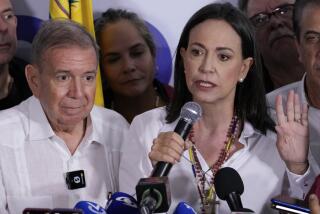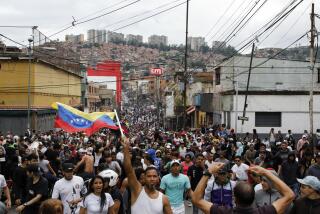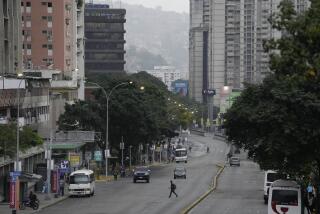Mugabe’s grip on power weakens
HARARE, ZIMBABWE — President Robert Mugabe’s party has lost its majority in parliament after 28 years in power, election officials announced Wednesday, as the aging Zimbabwean leader faced a more damaging blow: the virtual certainty of a runoff in the presidential race that he has scant hope of winning.
With fewer allies left and few prizes to offer in the economically ravaged county, Mugabe faces a final do-or-die struggle to hold on to power in a second round of voting that many people here fear could turn bloody.
Word of the historic moment came in the deadpan tones of Zimbabwean electoral officials reading out voting figures on television.
Final results from the Electoral Commission early today gave opposition leader Morgan Tsvangirai’s Movement for Democratic Change party 99 seats, a breakaway MDC faction 10 seats, the ruling ZANU-PF party 97 and an independent, one seat. Three seats will require by-elections because candidates pulled out or died.
The MDC triumph was slightly dampened by party officials’ embarrassing math mistake. They declared Tsvangirai the winner of the presidential race with 50.3% of the vote, enough to avoid a runoff. But the party’s own figures showed he fell just short of the 50%-plus-one threshold for outright victory.
Tsvangirai, a former union official who has faced treason charges and beatings in a nine-year battle to unseat Mugabe, seems almost certain to win a second-round election.
One of Tsvangirai’s main challenges is to win the support of military and security commanders tied to Mugabe’s camp, many of whom are suspicious of the longtime opposition leader and fear that he will take away benefits they have reaped during nearly three decades of Mugabe’s rule.
Mugabe, who at 84 managed to address three campaign rallies a day during the campaign, has not been seen in public since Saturday’s vote. To some in the ruling party, the big mistake was letting him run: Many had wanted him to step aside but failed to unite last year around a possible successor.
Zimbabwe’s shattered economy, with a mind-boggling annual inflation rate of 100,000% or more, has left its people in severe hardship. Millions have fled; many others, in a country with a crippled health system and life expectancy among the world’s worst, have died.
The country, once a regional powerhouse and food exporter, relies on international food aid.
Mugabe’s accusations that Tsvangirai and international sanctions (aimed mainly at the elite) were to blame for the disaster did not wash with voters.
Mugabe’s ruling ZANU-PF party and Tsvangirai’s MDC are now vying for the support of the third candidate, ruling party defector and former Finance Minister Simba Makoni. Sources close to Makoni said he was unlikely to work with Mugabe.
Although Makoni won a modest 7% of the votes, according to the MDC’s count, he could be a key figure in ensuring a smooth transition. Makoni and leaders in his group were expected to meet today to decide their position on the expected runoff.
Makoni is acceptable to the security forces, which are dominated by the ruling party and could be spoilers in case of a Tsvangirai runoff victory. Military commanders are expected to woo the Makoni camp, seeing him as almost the last hope for staving off a Tsvangirai presidency.
Some commanders have said openly that they will never salute Tsvangirai, and Mugabe has vowed that his rival will never lead Zimbabwe.
The election commission has not released final vote tallies in the presidential race, in part because some figures had to be verified after opposition challenges. But under a reform pushed through under pressure from Zimbabwe’s neighbors, each polling station posted its results, allowing the MDC to do its own tally.
The party says that of the 2,382,243 votes cast, Tsvangirai received 1,171,079, or about 49%, and Mugabe won 1,043,349, almost 44%.
Though the opposition leader fell short of an outright victory, he achieved an important strategic objective: throwing Mugabe, a master political manipulator, off balance.
However, ZANU-PF officials are already planning their campaign for the runoff, which will play heavily on fears among those given land seized from white farmers that the opposition would take it away.
“You cannot forget the rerun will be based on that scenario, to say, ‘Are you really ready to surrender the land?’ ” noted a senior party official. “The bottom line is that as soon as the MDC comes in, there will be a reversal of the land program. These are the things that people are looking at now.”
Retired Maj. Kudzai Mbudzi, a former ruling party member now loyal to third-place candidate Makoni, predicted that the runoff would reprise the violence and intimidation that occurred during elections in 2000 and 2002.
“As ZANU-PF, we used violence to win elections -- that and land,” Mbudzi said. “I was part of the formation. We instilled fear.
“If you burn one opposition supporter’s house, all of the rest will change,” he said. “If you beat up several people, all of the rest will change. If two or three of them disappear, never to be traced, the rest will change.” Mbudzi said he was not directly involved in violence.
He acknowledged that there were differences of opinion between Makoni’s forces and the MDC, but said their problems with ZANU-PF were impossible to reconcile.
“You can never trust Mugabe,” Mbudzi said. “Mugabe has now offered everybody within ZANU-PF the vice president position in return for support. He’s run out of promises.”
Makoni’s group is vying for maximum influence and positions in a future administration, playing on its perceived ability to win over the security apparatus.
Many are predicting that should Mugabe fall, the ruling party will shatter. It has been deeply divided over the succession since early last year. Mugabe rebuffed attempts to usher in another presidential candidate, insisting that he was the only one who could win elections.
Despite the dissent, he ran unopposed for its nomination at a party congress in December.
U.S. State Department spokesman Sean McCormack said the parliamentary results showed that Zimbabweans had voted for change after decades of Mugabe’s rule.
“There is clearly a moment of change here in Zimbabwe,” he said Wednesday, “because you do have the opposition gaining many more seats than they previously had.”
--
More to Read
Sign up for Essential California
The most important California stories and recommendations in your inbox every morning.
You may occasionally receive promotional content from the Los Angeles Times.










